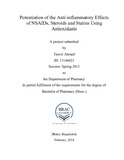| dc.contributor.advisor | Chowdhury, Fabliha Ahmed | |
| dc.contributor.author | Ahmed, Tanvir | |
| dc.date.accessioned | 2019-01-02T07:19:41Z | |
| dc.date.available | 2019-01-02T07:19:41Z | |
| dc.date.copyright | 2018 | |
| dc.date.issued | 2018-02 | |
| dc.identifier.other | ID 13146021 | |
| dc.identifier.uri | http://hdl.handle.net/10361/11067 | |
| dc.description | This project report is submitted in partial fulfilment of the requirements for the degree of Bachelor of Pharmacy, 2018. | en_US |
| dc.description | Catalogued from PDF version of project report. | |
| dc.description | Includes bibliographical references (page 49-55). | |
| dc.description.abstract | Inflammation is the normal defensive mechanism in our body, but in some cases it may be responsible for causing varieties of diseases. In those kinds of situations, it becomes a major concern for our normal health condition. For this instance, there are several anti-inflammatory drugs present for the treatment of inflammatory diseases. However, the conventional anti-inflammatory drugs give long term side effects. Thus, it is better to use them in a low dose for a shorter duration of time. We have used antioxidant in our project work in order to find out the enhancement of the therapeutic effect of the anti-inflammatory drugs like Diclofenac (NSAID), Prednisolone (steroid) and Atorvastatin (statin). Inflammation was induced in two ways using carrageenan and formalin. Carrageenan produced local inflammation and formalin induced neuropsychiatric effects. The inhibitions of such responses have been measured using a drug alone and in combination with antioxidant. The result of this study has shown that in case of carrageenan mediated inflammation, the combination of 5mg/kg Diclofenac and 200mg/kg Vitamin C has given the highest inhibition of 74.19%. On the other hand, the poorest performance was shown by the combination of 5mg/kg Prednisolone and 100mg/kg Vitamin C giving an inhibition of 32.57%. The 100mg/kg & 200 mg/kg Vitamin C have given respectively 18.98% and 20.95% inhibition alone. In case of formalin mediated inflammation group, the combinations of 5mg/kg Diclofenac and 200mg/kg Vitamin C have given 97.25% inhibition. On contrary, the combinations of 8mg/kg Atorvastatin and 100 mg/kg Vitamin C have given 50.55% inhibition only. Here, 100mg/kg & 200 mg/kg Vitamin C have given respectively 94.51% & 97.53% inhibition alone. According to the results, the combination of 5mg/kg Diclofenac and 200mg/kg Vitamin C have given the most inhibition in both local and neuropsychiatric inflammation induced by respectively carrageenan and formalin. So, this study actually recommends a new combination of drug therapy which will work against both local and neuropsychiatric effect caused by inflammation. | en_US |
| dc.format.extent | 55 pages | |
| dc.language.iso | en | en_US |
| dc.publisher | BRAC University | en_US |
| dc.rights | BRAC University project reports are protected by copyright. They may be viewed from this source for any purpose, but reproduction or distribution in any format is prohibited without written permission. | |
| dc.subject | Antioxidants | en_US |
| dc.subject | Anti-inflammatory effect | en_US |
| dc.title | Potentiation of the anti-inflammatory effects of NSAIDs, steroids and statins using antioxidants | en_US |
| dc.type | Project report | en_US |
| dc.contributor.department | Department of Pharmacy, BRAC University | |
| dc.description.degree | B. Pharmacy | |

